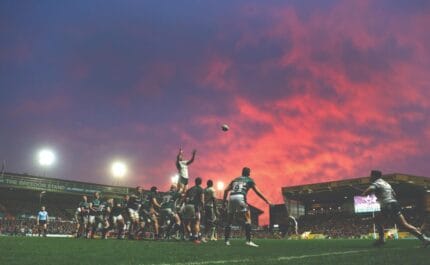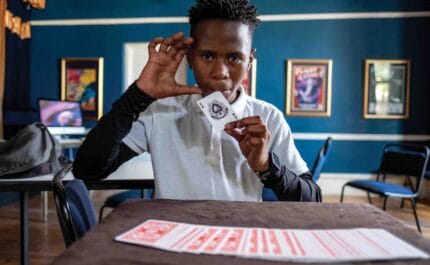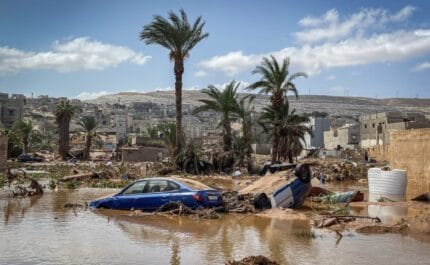Ahead of the game: Accidentally uncovering a massacre whilst reporting on African Football
In February a group of football journalists were in Gabon to cover the Africa Cup of Nations, which was expected to project a polished image of the host nation. But away from the pitch they stumbled upon evidence of a massacre that exposes the brutality at the heart of the country
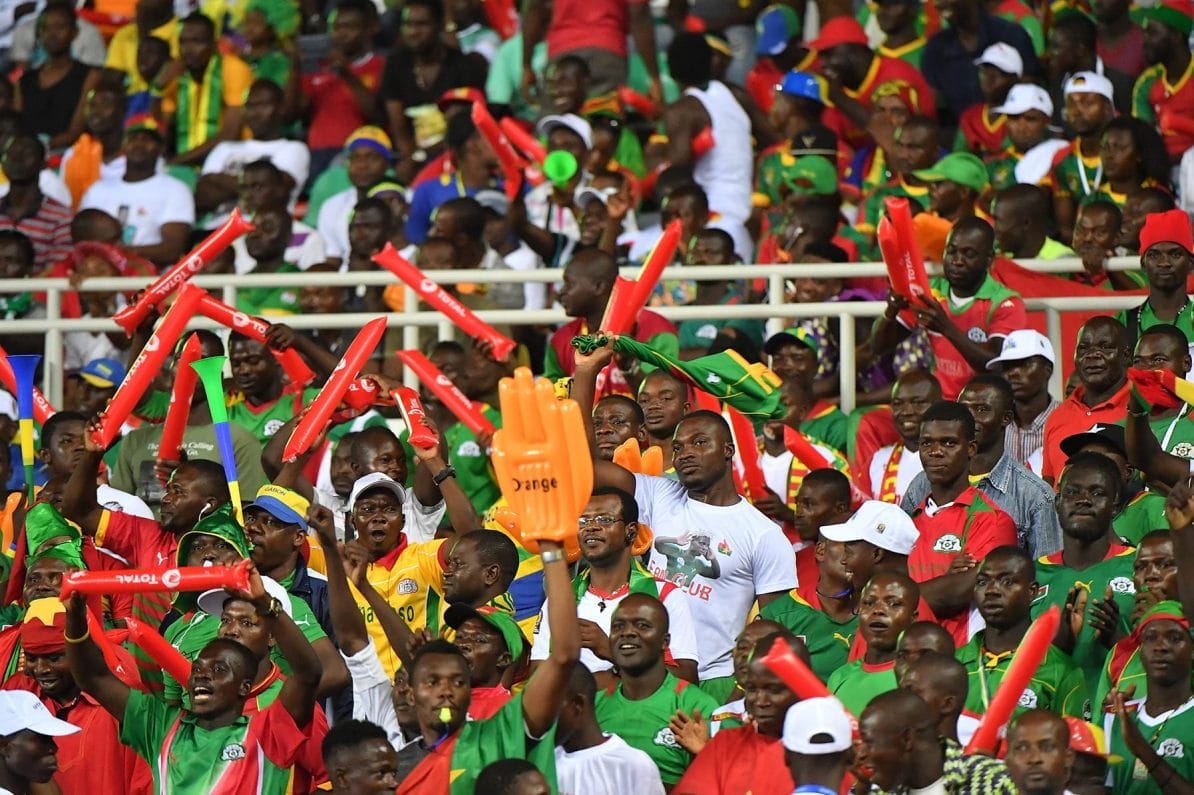
Fans during the 2017 Africa Cup of Nations match between Burkina Faso and Cameroon in Libreville, Gabon on 14th January 2017. Photo: Christian Liewig/ABACAPRESS.COM
5th February 2017 (Taken from: #26)
We didn’t go to Gabon to find a massacre. We went to cover a football tournament. But one morning between the group stage and the quarter-finals of the 31st Africa Cup of Nations, as we headed with a dull sense of responsibility to a press conference being held by Jean Ping, the leader of Gabon’s largest opposition party, we stumbled into something far more serious.
It began with a misunderstanding. The press conference was being held at Ping’s residence but our taxi driver took us instead to the campaign headquarters Ping had used for the August 2016 election. The place was deserted and, as we blundered around trying to work out where we were meant to be, the realisation dawned that something terrible had happened there. Windows were shattered, the gateposts dimpled with bullet holes, the internal doors buckled and broken and the walls appeared to be streaked with blood.
A caretaker arrived, explained our error and directed us to where we were supposed to be, but we couldn’t forget what we had seen. The following day we went back and slowly began piecing together the grim events of the night of 31st August 2016.
Along the Boulevard de l’Indépendance, which traces the coast in the old centre of Libreville, stands Gabon’s Statue of Liberty, a stone sculpture of a half-male, half-female figure breaking triumphantly free of its chains. The work was commissioned by the former president Omar Bongo as a reminder of Gabon’s past: the freed slaves who arrived here in the 1840s from a ship bound for Brazil, and Gabonese independence from French Equatorial Africa more than a century later.
But it also inadvertently points towards the present. The freed citizen doesn’t look out to the Atlantic Ocean nor across to Libreville’s apartments, markets and slums. Instead, it faces directly towards the vast Presidential Palace, a brutalist rectangle of a building surrounded by a dead zone in which loitering is forbidden. When we take a photograph of the sculpture, three soldiers approach within seconds, pointing chez Bongo and loudly shouting “Sécurité!”
“Maintaining the family business has proved difficult for Ali Bongo during a time of declining oil revenues”
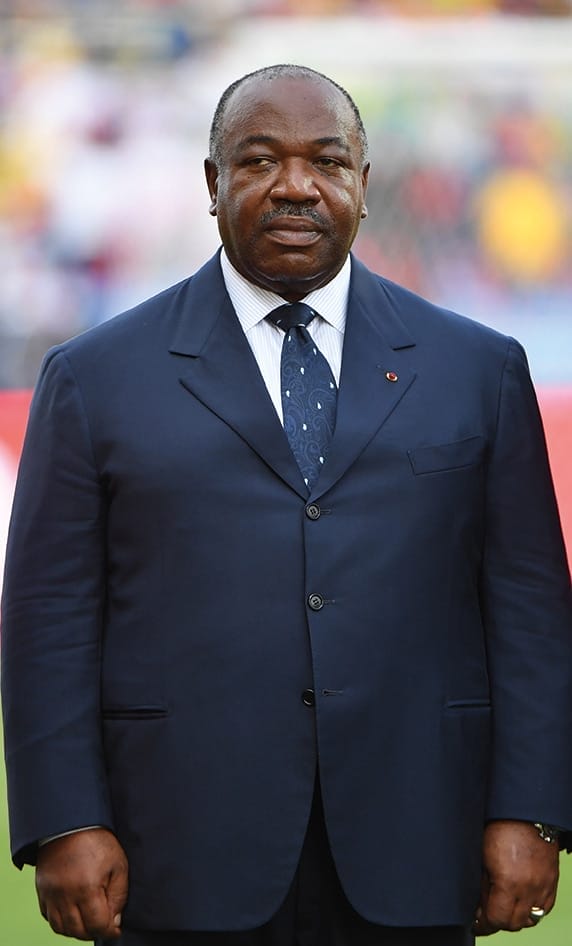
Ali Bongo Ondimba during the opening ceremony. Photo: Christian Liewig/ABACAPRESS.COM
Backed by France, Omar Bongo ruled Gabon as Le Grand Camarade (despite being under five feet tall) from 1967 to 2009 when he bequeathed the country to his son Ali. Omar regularly polled over 95 percent of the vote, even after multi-party elections were introduced in 1990 – “perfect reflections of the truth”, as he later recalled. Maintaining the family business has proved difficult for Ali during a time of declining oil revenues. Gabon today has a population of just under two million, half of whom live in Libreville. Many of them are young and frustrated, more aware than ever of the inequality generated by the country’s oil. The old guard who supported Omar have slowly splintered away. “Ali is not his father,” one former minister tells us. “He doesn’t listen to different voices.”
When Ali won the 2009 election there was protracted political violence for the first time in two decades (in 1990, French troops had stepped in to quell riots following the assassination of a leading dissident). In 2010 opposition figures, many of whom had served under Omar Bongo as part of the governing Gabonese Democratic Party (PDG), formed the Union Nationale, a coalition aimed at unseating Ali.
Tensions have been heightened by Ali Bongo’s extravagant spending, which now extends to football tournaments. Gabon co-hosted the 2012 Cup of Nations with Equatorial Guinea after Morocco’s late withdrawal over Ebola fears, and then agreed to replace Libya for the 2017 event. In both cases, the decision was portrayed as Gabon stepping in to help Africa. That may have played well at the African Union, but it was unpopular at home. At a time when health and education budgets have been cut to tackle debt – which has increased from an estimated 20 percent of GDP to 62 percent in six years – staging the Cup of Nations cost somewhere between $313 million (the official figure) and $770 million (according to a budget leaked before the tournament). “There are not enough schools, classrooms,” Ping told us after the press conference. “Even chairs they do not have. How can you invest in stadiums when you are facing such big problems?”
Although the large migrant population in Gabon ensured that there were decent crowds at games involving Cameroon, Democratic Republic of the Congo, Burkina Faso and Mali, there was nothing like the excitement of five years ago for the home side, and when Gabon were eliminated in the group stage after a goalless draw with Cameroon on 22nd January the general reaction was one of indifference.
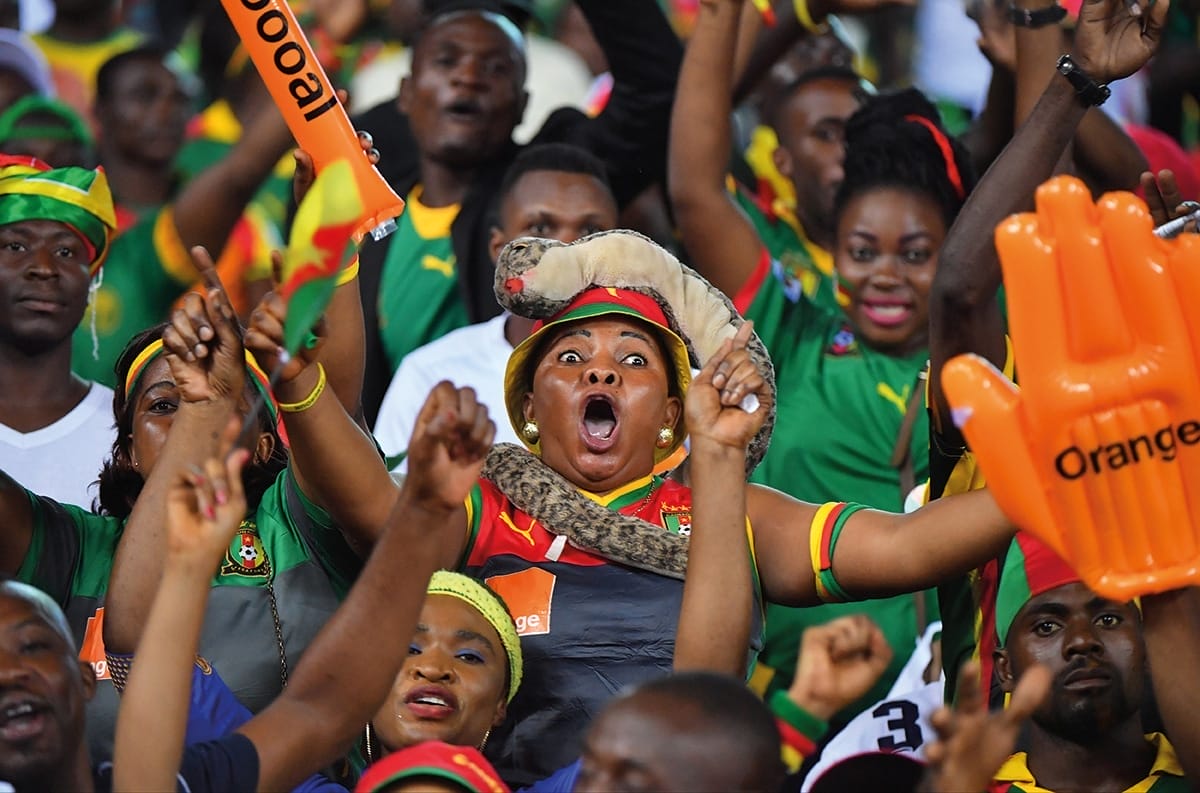
Fans at Cameroon vs Gabon in Libreville on 22th January 2017. Photo: Christian Liewig/ABACAPRESS.COM
Before becoming leader of the Union Nationale, Ping was very much part of the establishment. A senior minister under Omar, he was once married to, and has children with, Omar’s daughter Pascaline, Ali’s half-sister. Polling suggested that he led in five of Gabon’s seven provinces before the election on 27th August 2016 but for four days afterwards no result was announced by Cenap, the country’s electoral commission. On 31st August, opposition supporters gathered at Ping’s headquarters to march on Cenap and demand resolution. Among them was Stéphanie (not her real name), an opposition activist. They were just setting off when the result was announced. Having claimed 95 percent of the vote in his home province of Haut-Ogooué, with an incredible reported turnout of 99.93 percent, Bongo had retained the presidency by 6,000 votes. “We were angry,” said Stéphanie. “We said that wasn’t possible.”
“There are not enough schools. How an you invest in stadiums when you are facing such big problems?” – Jean Ping
The crowd was incensed, but the government was ready for them. Tear gas was used at Lac Bleu, between Ping’s headquarters and Cenap’s offices. According to Stéphanie, soldiers also fired live rounds. As she helped to take the injured to hospital, some demonstrators approached the national assembly and attempted to set it on fire: scorch marks were still clearly visible on either side of the main entrance when we visited five months later. At around 7pm, Stéphanie returned to the campaign headquarters. “On the second floor they’d collected all the injured people,” she said. “There was blood everywhere and very few doctors to look after these people.” The Red Cross sent three cars and two more were found to take the most seriously injured to hospital. Stéphanie went with them.
What followed is harder to piece together. There is video shot from inside the headquarters showing opposition supporters milling around on the dirt road outside the building at around 8pm. Later footage shows two helicopters circling above. And everybody seems to agree that between midnight and 1am government forces, dressed in black and wearing masks and helmets, approached from the major road that runs parallel to the dirt road beyond a line of bushes.
The protesters fled along the driveway. Some took cover in the gatehouse and some under cars that were parked there. Some ran across the car park behind the building and either scaled the back wall or scrambled into the Equatoguinean embassy next door. Others took cover in the headquarters itself.
Three opposition supporters who asked for anonymity – let’s call them Christophe, Franck and Didier – who were there that night showed us around the headquarters. According to Christophe, the government forces initially fired tear gas, then bullets. Wounded by a shot to the calf, he climbed to the fourth floor.
“Those who couldn’t get over the wall went under the cars,” said Franck. “They shot under the cars – young people, fathers, mothers, old people… I was on the top floor and could see down.”
Christophe lay on the floor, keeping below the level of the windows, listening to what he believes were police working along the line of cars, picking off their victims. “I could hear their cries,” he said. “All night this was happening. I could hear people crying, ‘Please don’t kill me! I’m Gabonese! I won’t demonstrate any more.’ Then they went quiet. We guessed they were killed. That went on from one or two am to five am.” He believes the bodies were taken away in police cars and that some are still missing.
In the suburb of Angowe we saw the grave of Paul, a 31-year-old plumber who supported the opposition and was at the headquarters that night. We spoke to his sister as his two-year-old son played on the porch of the family home with an inflatable hand produced by Orange, a sponsor of the Cup of Nations. It seems Paul was shot in the leg shortly after 1am. He was eventually moved to the hospital but by then it was too late and he died of blood loss. No cause was recorded on his death certificate.
It was clearly a terrifying and confusing time and we have no doubt that Christophe and Franck believe what they told us, but it’s often difficult to be clear exactly what they saw and what they have subsequently convinced themselves happened. There is evidence to support the story about the cars, though.
Down the left side of the driveway there are irregular paving stones and in the cracks between them we found small crystals of shattered glass, as you would expect had car windows been smashed.
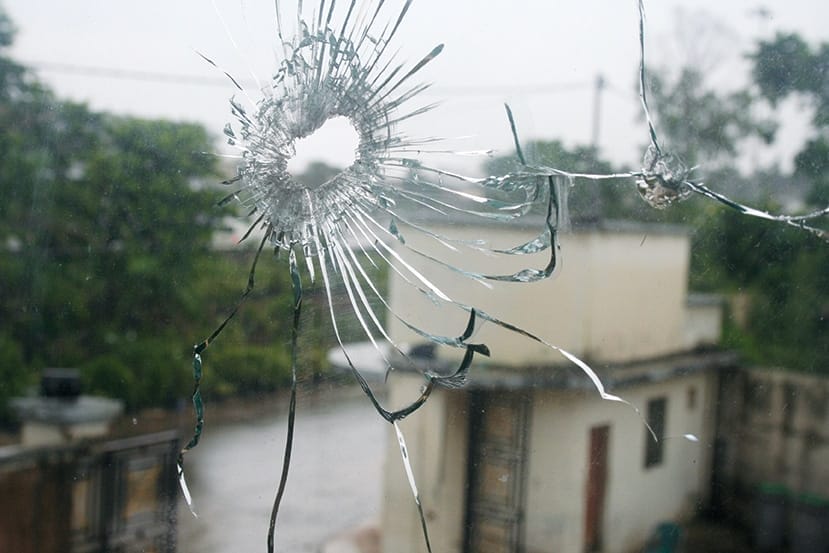
A damaged window in the former campaign headquarters of opposition candidate Jean Ping. Photo: Taimour Lay
Even more significant is the testimony of Serge, a former government advisor who lost both his nephew and uncle that night. After a week of searching, he tracked down their bodies. Both had been killed by a double gunshot to the head. Rather than waiting for the government, Serge paid a coroner to conduct a private autopsy. Most of the government-funded autopsies record the cause of death that night as “accident” but Serge’s nephew’s death certificate is clear: he had been shot twice in the leg but had also sustained “a puncture-like wound on the right eyebrow at the inner edge and on the lower part of the right cheek… He died as a result of secondary intracranial haemorrhage, wounds caused by the penetration of small-calibre bullets at the forehead.”
That sounds very much like a cold-blooded execution; certainly it’s hard to square with government claims of a firefight or jittery riot police panicking in the face of violent protesters. RFI and AFP were two of the few international news organisations in Libreville at the time. “I had been speaking to people trapped inside the building, including some senior opposition officials, during the evening,” said RFI’s Sebastian Nemeth. “They were terrified, people were hiding in cupboards, hiding on the ground, they were saying there was shooting going on all night.” But by the time AFP photographer Marco Longari was able to gain access to the site on 3rd September, there were no bullet-casings or blood to be seen outside the building. That doesn’t mean the massacre didn’t happen, but it does mean a clean-up must have been extremely efficient.
One thing which seems clear is that at around 5am on 1st September, police entered the building. “They told us to kneel down, take our shirts off and put our hands on our heads,” said Christophe. Franck believes there were around 1,500 Ping supporters in the building at the time. He got away because he knew one of the policemen, but hundreds were arrested. It’s not clear whether they have all yet been released.
The injured, including Christophe, were taken to hospital. “I got my brother to come and get me,” he said. “I told the doctor I was just going outside for a moment to give my brother a key. I was walking with a stick so they thought I couldn’t go far, but my brother was in a car so I got in and left.”
Didier was taken to the headquarters of Cedoc, one of Gabon’s five secret police forces. “They questioned me about what my problem was with Bongo, why I was causing trouble,” he said. “They told me that he is here and he will always be here.”
“There’s no sense in voting. Nothing changes. Elections mean violence”
The violence was not limited to the campaign headquarters. Minutes from the main seafront boulevard in Libreville, you descend into dirt tracks and one-room wooden shacks. This is the area locals smilingly call “Venez-Voir” – “Come and see”. Francis (not his real name) is 27 years old. He brings out three plastic chairs from the darkness of his shack and begins to tell us about his younger brother. The grief is still fresh as he tells the story. We walk into a central clearing and Francis points to each place in turn. “That’s where my brother was shot. That’s where the shooting came from. That’s where we ran.”
According to Francis, his brother was entirely apolitical. “He didn’t take part in any protests,” he said. “Our mum forbade us. She didn’t even let us vote in elections. There’s no sense in voting. Nothing changes. Elections mean violence.”
“On the night of 1st September, we were in the street by the bar on the corner. We’d hang out there playing computer games. On the road that runs above and around us, the police and military were moving a lot and shooting, I think trying to make sure people were still inside their homes. At around 2am our mum called us and told us to come back. When the shooting came closer, there were people running. My brother ran to that coconut tree. He called my phone and said: ‘I can’t come. I can’t move my leg.’ I went to him. We brought him into the house. He died at the hospital. One bullet, to his right side.”
In the days and weeks that followed, Stéphanie began compiling a report into what had happened in the aftermath of the election. She visited hospitals and morgues and took photographs of the dead and injured. Eventually she was arrested and held for nine days in solitary confinement before being released, her notes confiscated.
Thanks to Stéphanie’s work and that of other opposition figures, though, the names of 23 fatalities are known and it’s certain that at least seven others died. The true figure, however, is almost certainly much higher. At the end of last year, morgues in Libreville buried more than 20 unclaimed bodies – an unusually high number – in a mass grave. The suspicion is that families are wary of claiming their relatives and thereby associating themselves with the opposition.
There was something a little uncomfortable about continuing to cover the tournament while investigating a massacre. The football was occasionally uplifting; we savoured Burkina Faso’s joy on upsetting the odds to reach the semi-final and Egypt’s triumphant return after missing the last three tournaments to reach the final on 5th February. They faced a young and ebullient Cameroon side, backed by thousands of fans who had travelled south on overnight buses from Douala and Yaoundé to Libreville. Egypt took the lead, before Cameroon came back and won their first Cup of Nations since 2002 with a brilliant late goal from Vincent Aboubakar. The crowd were in raptures, but we couldn’t stop thinking about what we’d seen outside the stadium.
The government had swiftly become aware of what we were doing and soon after we began investigating we received a call from a government PR officer warning that “We know who you’ve been talking to. Back off.” Despite this, on the day after the final, hours before we flew home, we were invited to meet the prime minister, Emmanuel Issoze-Ngondet, in his office. He is adamant the August 2016 election was fair, despite the doubts of “biased” EU observers. He acknowledges there was some violence on the night of 31st August but insists that police fired only after being shot at. He said the Ministry of Justice is conducting an inquiry, but few outside his office expect anything other than a whitewash. When we asked Christophe if he expected the inquiry to expose any wrongdoing, he laughed.
The opposition seems to have withdrawn within itself since the election. It appears that the bloodshed has so shaken Ping that he will not countenance further protest – or perhaps he fears the anger of the young demonstrators who want to overturn the system entirely rather than merely installing a new leader. The result is frustration. “We know Ping and Bongo were friends,” said Curtis, a 27-year-old dissident who tried to protest on the opening day of the Cup of Nations but was chased away by a volley of smoke bombs. “That’s politics. But we want change.”
What remains is a sense of hopelessness, a feeling that the tournament offered the chance to shine a light on the events of 2016 but that the world turned a blind eye. “An autocratic regime kills people,” said an editor from a British broadsheet when we pitched them this story. “That’s what they do. Why do I care?”
In Gabon resentment against Bongo festers, held in check by fear. There are still many who disappeared on 31st August 2016 who remain unaccounted for: dead, in jail or missing. And it seems that Bongo, as Didier’s captor said, is here and will always be here.
For all the Cameroonian glee, and for all they had deserved their triumph, as fireworks crackled from the roof of the stands while players celebrated on the pitch, it was hard not to hear an echo of the gunshots from the previous August.
Slow Journalism in your inbox, plus infographics, offers and more: sign up for the free DG newsletter. Sign me up
Thanks for signing up.
